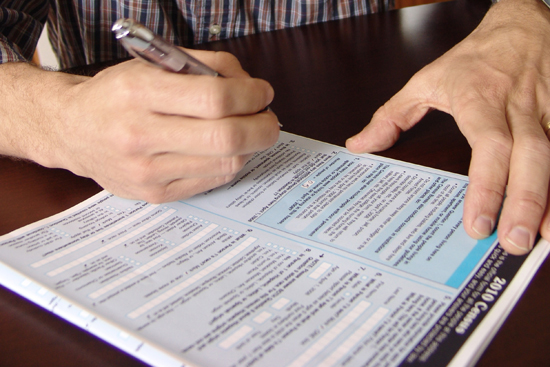The Census Wants You!
Student response key to federal resources for Boston

Have you filled out the census yet?
Boston’s counting on you.
The census is “the cornerstone of the country’s democracy,” says Tia Costello, partnership coordinator for the U.S. Census Bureau. “If we are going to have government for the people, by the people, it’s important to know how many people we have.”
But the census has pragmatic impact as well. The tally is used to define how much federal funding will flow into specific districts, cities, and towns; officials say that every person who fills out the census adds $1,200 a year in federal support to Boston’s coffers. That money goes to school lunches, medical care at Boston Medical Center, and the MBTA, among many other things. In addition, a Massachusetts congressional seat could be cut if the state population shrinks.
So for Boston and the entire state, getting college students counted, and counted here, translates into more clout and a lot more money.
According to the 2000 census, young adults age 20 to 24 represent Boston’s largest age group. Boston also has the largest proportion of college students of any major U.S. city, almost 18 percent.
But the college population is especially tricky to count, says Costello. Many college students aren’t sure where or how to file; they may receive a census form in their dorms or off-campus apartments, but don’t fill it out because they mistakenly assume their parents should include them in the family count back home.
Not so, says Costello. Funding related to census data should be allocated where people spend the majority of their time, and “if students are at school eight months of the year, the funds belong here,” she says. “There are clear instructions that ask parents not to include a child away at college.”
While the instructions are clear, a closer look at the form also reveals an unusual grouping: college students are combined with people “in a nursing home, jail, prison, detention facility, etc.”
This decade’s census is only 10 questions long, one of the shortest and simplest in history. The information requested is basic: name and address, contact information, age and date of birth, gender, ethnicity and race, and how many people live in the residence.
For students living off campus, the home or apartment has received one form. There’s room for everyone to sign up, and the information should be mailed back by April 1. If forms are not returned, a census taker may come to the door to follow up.
Students living in dorms will receive an Individual Census Report in April or May. Boston has a strong track record of joining the census ranks, according to the Census Bureau. In the 2000 census, for example, 74 percent of Massachusetts residents responded, compared with a nationwide rate of 72 percent. Already this year, 26 percent of Bay State residents have returned their forms, higher than the 20 percent national return rate.
“We’re doing a lot to engage colleges to know about this,” Costello says, for accuracy’s sake as well as for Boston’s.
Rachel Sprung (COM’11) heard talk about the census in class, and got right to it. “In 2000, I remember watching my mom fill out the census and being told that it’s very important to make the time to do it,” she says. “Now that I received one personally, I made sure to send it back.”
The census also is looking for part-time census takers. The job pays $22.25 per hour and is available immediately. An employment test is required and people work close to home. For more information, see the job description on the Student Link work page, under the “general” category.
There will be a Census Day College Rally on Wednesday, March 31, from 3 to 6 p.m. at the Agganis Arena Main Lobby, 925 Commonwealth Ave. Secretary of State William Gavin will attend, and there will be free pizza.
Amy Laskowski can be reached at amlaskow@bu.edu; follow her on Twitter @amlaskow.
Comments & Discussion
Boston University moderates comments to facilitate an informed, substantive, civil conversation. Abusive, profane, self-promotional, misleading, incoherent or off-topic comments will be rejected. Moderators are staffed during regular business hours (EST) and can only accept comments written in English. Statistics or facts must include a citation or a link to the citation.